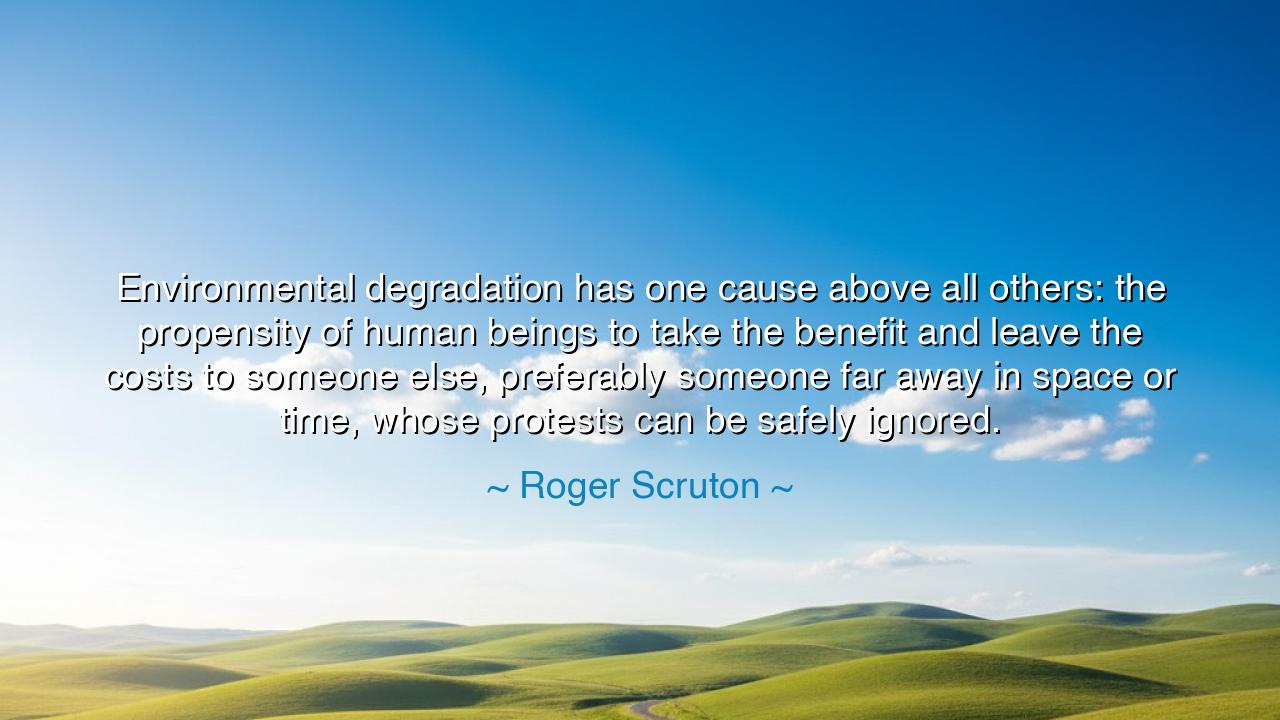
Environmental degradation has one cause above all others: the
Environmental degradation has one cause above all others: the propensity of human beings to take the benefit and leave the costs to someone else, preferably someone far away in space or time, whose protests can be safely ignored.






Hear now the grave wisdom of Roger Scruton: “Environmental degradation has one cause above all others: the propensity of human beings to take the benefit and leave the costs to someone else, preferably someone far away in space or time, whose protests can be safely ignored.” In these words we are shown the root of humanity’s betrayal of the earth. Not mere accident, not simple ignorance, but selfishness dressed in the garments of convenience. We pluck the fruit of the orchard, yet leave the rot for unseen hands to tend; we drink from the stream, yet foul it for our children’s children.
The meaning of this quote lies in the timeless truth of moral laziness: men and women seek immediate benefit, but shun responsibility for the costs. Factories fill the air with smoke to enrich their owners, while distant villages choke on the soot. Plastics are thrown into the sea, where unseen creatures suffer and die. And when the reckoning comes generations later, those who caused the wound are already dust, while their descendants inherit a poisoned earth. To shift the burden onto the far-off or the unborn is the most cowardly of thefts: stealing not only wealth, but life itself.
History bears grim witness to this. Consider the Industrial Revolution in Britain. Wealth poured into cities, fortunes were made, and empires expanded. Yet coal smoke blackened the skies, rivers like the Thames turned into open sewers, and workers lived amid filth and disease. The rich took the benefits, while the poor bore the costs. For decades, the voices of the suffering were ignored until cholera and stench forced the rulers to act. This is the pattern Scruton unmasks: the powerful cast their debts upon those too weak or distant to resist.
Even in our own time, the same tale is told. Wealthy nations burn fuels and consume endlessly, while rising seas flood the islands of the Pacific, whose people had no part in the crime. Forests are felled to feed appetites in distant lands, leaving indigenous tribes displaced, their voices too faint to reach the ears of those who feast on their loss. This is the meaning of Scruton’s warning: the costs are hidden, delayed, or displaced, but never erased. Someone, somewhere, someday, must pay them.
The ancient Greeks told of King Midas, who wished that all he touched might turn to gold. His desire was granted, and for a moment, he rejoiced in the benefits. But soon he found that his food, his drink, even his beloved daughter became lifeless gold at his touch. In seeking gain without cost, he brought ruin upon himself. So too with humanity: in pursuing endless consumption while ignoring the price, we risk turning the living world into lifeless treasure.
The lesson for us is stark and holy: do not shift your burden onto the unseen, the distant, or the unborn. Own the full weight of your actions. When you consume, ask: who bears the costs? When you waste, ask: who must endure this degradation? The wise do not ignore the cries of those unseen, but remember that time will carry our deeds forward, and our children will one day ask why we left them ashes instead of gardens.
Practical action begins in daily life. Choose goods that do not exploit distant lands. Reduce what you waste, for waste does not vanish, but gathers in the corners of the earth. Support leaders and policies that honor responsibility, that do not merely harvest benefits while casting aside the consequences. Above all, teach the next generation that stewardship is the mark of true greatness, and that no joy is pure if it is bought at another’s suffering.
Thus let Scruton’s words echo like a trumpet across the ages: environmental degradation is born of selfishness, the sin of taking without paying. To heal the earth, we must reverse this: embrace the cost, bear the burden, and leave behind blessings rather than curses. For only when we honor both the benefits and the costs of our choices shall the earth endure in beauty, and our descendants rise to praise us rather than to curse our names.






AAdministratorAdministrator
Welcome, honored guests. Please leave a comment, we will respond soon